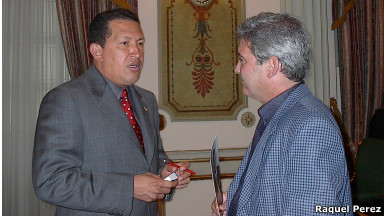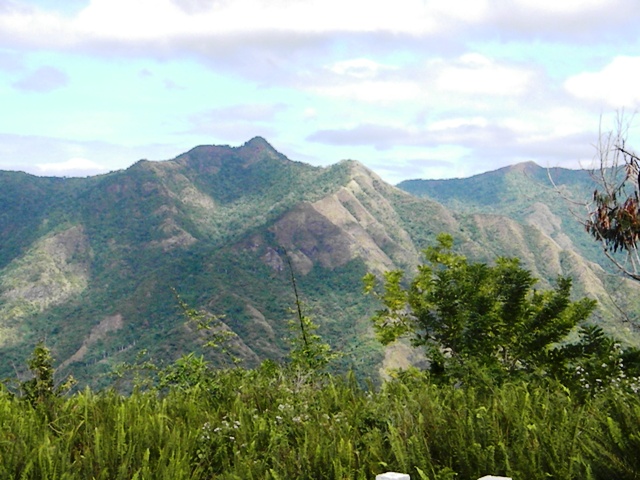PRESIDENT CHAVEZ
I met Hugo Chavez in 1994, just out of prison he visited Cuba and Fidel Castro with honors of Head of State. As I heard speak at the University of Havana, trying to understand it was up to the Cuban leader.
Chavez was a soldier who attempted a coup against a democratically elected government. Also remember that driving a language not very socialist, but made constant references to social justice and nationalism.
The political cost of receiving a coup was too high to make it without a purpose, so I tried to find out who was behind this new friendship with Fidel. For starters, I learned that the coup had been much more than a military putsch.
Supe involving civilians, including some old fighters in the past were closely tied to Cuba and should undoubtedly be a valuable source of information for Havana on personality and political ideas of the Venezuelan military.
But beyond anything he had informed on each other, between Chavez and Fidel came a love at first sight. I have two decades in Cuba and have never seen the Commander laugh out loud as I did when I visited the Venezuelan.
Castro found his successor in Latin America and Chavez a political fox whose advice he paved the way on more than one occasion. And they saved each other, Cuba received oil and doctors and teachers to Venezuela social missions.
The first time I visited a friend Venezuelan Caracas participating in bilateral negotiations told me that Fidel Castro wanted to send doctors could not free but then the balance of trade.
Later she explained that Cuban President Chavez pressured to accept that this health care exchange for Venezuelan oil because the law was not allowed to send the oil to Cuba by pure solidarity.
To my knowledge, the only foul play as there were between the two starred Fidel Castro. Chavez challenged him to a baseball game between the veterans and the Commander players faced the Cuban national team disguised as old people.
During the coup of 2002 reported by the U.S. television network Telemundo on an interview Chavez’s daughter, where he claimed that his father had never resigned as saying the coup to justify his overthrow.
Telemundo is seen in Venezuela and I think with that story somehow contribute to reveal what was happening because a few days later we were called to Caracas and President Chavez gives first press interview after his release.
The meeting was at the Palace of Miraflores and we talked about his arrest, the attempt to form another government by force, the role of the press in the coup, its relations with the U.S. and Spain. It was very serene and less bellicose than his speeches.
I remember that placed great emphasis on the message he received from Fidel in Miraflores, in the first moments of the coup. Castro advised him not be killed, to avoid a useless sacrifice and stay alive to continue the fight later.
Chavez seemed a fairly straightforward man, treated us with respect, we had coffee together, we took pictures and we gave each team member a copy of his second Bible, the Constitution of the Republic signed by it.
We had waited all day to finish in Miraflores to dispatch and the interview ended at midnight. We ran to send satellite cuts so the chain would start to announce that Venezuelan President exclusively.
We were exhausted and back with my cameraman, Victor Buttari, forget the taxi original cassettes. Incredibly could recover in Caracas at 3 am, to board the plane for Miami at 6 am.
This weekend, Cuba entire gasped upon hearing the bridal Chavez, several of my friends called me to tell me excited. Hearing it reminded some anecdotes and shortly after I started writing this post to share.
Sources:LettersFromCuba/FernandoRavsverg/BBC/UK/www.thecubanhistory.com
Castro, Chavez: “The End”/ Arnoldo Varona, Editor
EL PRESIDENTE CHAVEZ
Conocí a Hugo Chávez en el año 1994, apenas salido de la prisión visitó Cuba y Fidel Castro lo recibió con honores de Jefe de Estado. Mientras lo oía hablar en la Universidad de La Habana, trataba de entender que se traía entre manos el líder cubano.
Chávez era un militar que intentó dar un Golpe de Estado contra un gobierno democráticamente electo. Además recuerdo que manejaba un lenguaje no muy socialista, aunque hacía constantes referencias a la justicia social y al nacionalismo.
El costo político de recibir a un golpista era demasiado alto para hacerlo sin un propósito, así que traté de averiguar que había detrás de esa nueva amistad de Fidel. Para empezar me enteré de que el golpe había sido mucho más que una intentona militar.
Supe que participaron civiles, entre ellos algunos viejos guerrilleros que en el pasado estuvieron muy ligados a Cuba y que sin dudas debían ser una valiosa fuente de información para La Habana sobre la personalidad e ideas políticas del militar venezolano.
Pero más allá de cualquier cosa que le hubiesen informado a uno sobre el otro, entre Chávez y Fidel surgió un amor a primera vista. Llevo dos décadas en Cuba y nunca he visto al Comandante reír a carcajadas como lo hacía cuando lo visitaba el venezolano.
Castro encontró a su continuador en América Latina y Chávez a un zorro político cuyos consejos le allanaron el camino en más de una ocasión. Y se salvaron mutuamente, Cuba recibió petróleo y Venezuela médicos y maestros para las misiones sociales.
La primera vez que visité Caracas una amiga venezolana que participaba en las negociaciones bilaterales me confesó que Fidel Castro quería mandar los médicos gratuitamente pero entonces resultaba imposible equilibrar la balanza comercial.
Tiempo después ella misma me explicó que Chávez presionó al presidente cubano para que este aceptara intercambiar la atención médica por petróleo porque las leyes venezolanas no le permitían enviar el crudo a Cuba por pura solidaridad.
Que yo sepa, el único juego sucio que hubo entre ambos lo protagonizó Fidel Castro. Chávez lo retó a un partido de béisbol entre veteranos y el Comandante lo enfrentó a los jugadores de la selección nacional cubana disfrazados de ancianitos.
Durante el Golpe de Estado del 2002 informé a través de la cadena televisiva Telemundo de EEUU sobre una entrevista a la hija de Chávez, donde aseguraba que su padre nunca había renunciado al cargo como decían los golpistas para justificar su derrocamiento.
Telemundo se ve en Venezuela y creo que con ese reportaje de alguna forma contribuimos a revelar lo que estaba ocurriendo porque unos días después fuimos convocados a Caracas y el Presidente Chávez nos da la primera entrevista de prensa tras su liberación.
El encuentro fue en el Palacio de Miraflores y hablamos de su detención, del intento de formar otro gobierno por la fuerza, del papel de la prensa en el golpe, de sus relaciones con EEUU y España. Estaba muy sereno y menos belicoso que en sus discursos.
Recuerdo que hizo mucho hincapié en el mensaje que recibió de Fidel en Miraflores, durante los primeros momentos del golpe. Castro le recomendaba no hacerse matar, evitar un sacrificio inútil y conservar la vida para continuar la lucha después.
Chávez me pareció un hombre bastante sencillo, nos trató con deferencia, tomamos café juntos, nos hicimos fotos y nos regaló a cada miembro del equipo un ejemplar de su segunda biblia, la Constitución de la Republica firmada por el mismo.
Habíamos esperado todo el día en Miraflores a que terminara de despachar y la entrevista acabó a medianoche. Salimos corriendo a enviar cortes por satélite para que la cadena empezara a anunciar que tendríamos al presidente venezolano en exclusiva.
Estábamos agotados y de regreso con mi camarógrafo, Víctor Buttari, olvidamos en el taxi los casetes originales. Increíblemente pudimos recuperarlos en Caracas a las 3 de la madrugada, para abordar el avión rumbo Miami a las 6 am.
Este fin de semana Cuba entera se quedó sin aliento al escuchar la despedida de Chávez, varios de mis amigos me llamaron emocionados para avisarme. Oyéndolo recordé algunas anécdotas y poco después me puse a escribir este post para compartirlas.
Sources:LettersFromCuba/FernandoRavsverg/BBC/UK/www.thecubanhistory.com
Castro, Chavez: “The End”/ Arnoldo Varona, Editor




